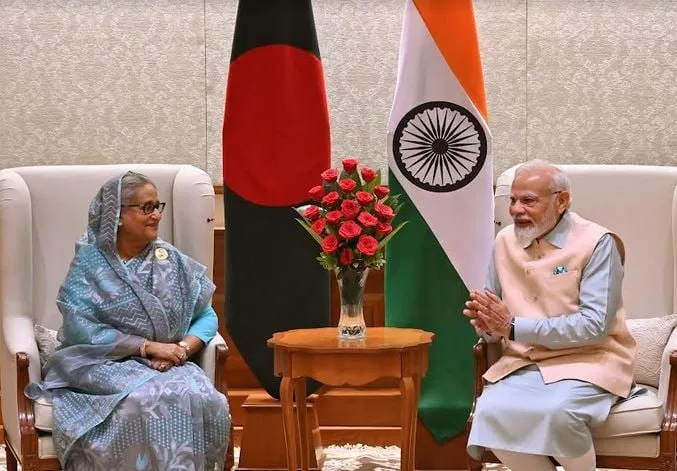
It is quite ironic that as the Republic of India claims an excellent bilateral relationship with Bangladesh based on “sovereignty, equality, trust, and understanding,” it is sheltering the erstwhile tyrant from the latter. What started off as a peaceful student-led movement to reform quotas on civil service jobs turned into a violent revolution against Prime Minister Sheikh Hasina, as ruling party thugs and police assaulted protestors and fired live ammunition. The tyranny tumbled once the Bangladesh military leadership refused to support further murders of civilians, and the proverbial masses stormed the official palace.
On August 5, Indian National Security Advisor Ajit Doval met Prime Minister Hasina and her entourage as they escaped from Dhaka and landed near Delhi. Thereafter, India provided her a safehouse and security. The world could see how the tyrant’s handlers in India readily accepted her, at a time when no other nation is offering her political asylum. India’s government has no shame in harboring an alleged mass murderer.
Sheikh Hasina’s Awami League government came into power in late 2008—for a second tenure—with Indian monetary resources and advice. The favor was returned as Sheikh Hasina halted any safe haven provided to insurgent groups that operated in India and countered Islamist extremism—both policies music to the ears of Delhi’s security establishment. India received carte blanche from Prime Minister Hasina’s government, as deals were signed on river sharing, settling contested territories, supplying electricity to Bangladesh, and transit across the nation to India’s remote, northeastern states. India also gained operational rights to a terminal in Mongla, Bangladesh’s second-largest seaport.
These deals did not go to Bangladesh’s favor—there was no equal water-sharing agreement for the 53 rivers flowing from India, border forces killed more than three hundred Bangladeshis in a ten-year span, and Bangladesh purchased power from India’s Adani coal power plant at double the cost of India’s electricity exchange market.
As one-sided elections repeatedly took place, India would stamp its seal of approval for Sheikh Hasina. Most alarmingly, Indian officials gathered at her residence as the nation was undergoing the revolution, discussing measures such as shoot-at-sight orders to quell the protestors. The message to their handpicked agent was clear, “put down the uprising by whatever means available at hand.”
Whereas one can understand a nation’s willingness to guard its security interests with assisting suitable governance in neighboring lands, blindly supporting someone like Sheikh Hasina—who has overseen the murders of army officers (2009 paramilitary mutiny where the killers were allowed to leave the base), Islamic schools’ teachers and students (2013 midnight massacre by police after a power blackout), and the final student-led protests of 2024 (1,000 fatalities of mostly students)—is a travesty of international law.
Now, Bangladesh’s interim government is led by Nobel peace laureate Muhammad Yunus, who noted that this a “second liberation.” Another advisor, former Brigadier General M. Sakhawat Hossain mentioned that Bangladesh border guards “will no longer turn their backs” if India starts firing. A third advisor, Nahid Islam, who was at the forefront of the student movement, recommended that India reconsider its “anti-people policy” regarding Bangladesh. There is a nationwide perception of India as the power behind the tyrant.
There must be a humanitarian component to a nation’s foreign policy; if only a mercantilist approach is utilized at the cost of supporting a murderous dictator, one day the suzerain state must pay the price. If this is the true nature of India’s “Neighborhood First” foreign policy, which claims to build cordial relations and economic integration with its smaller neighbors, then Bangladesh wants no part of it.
